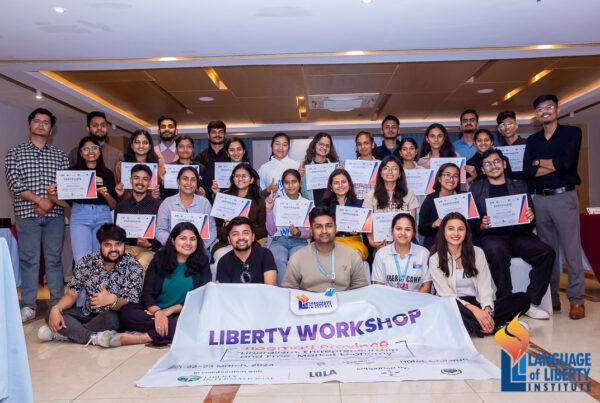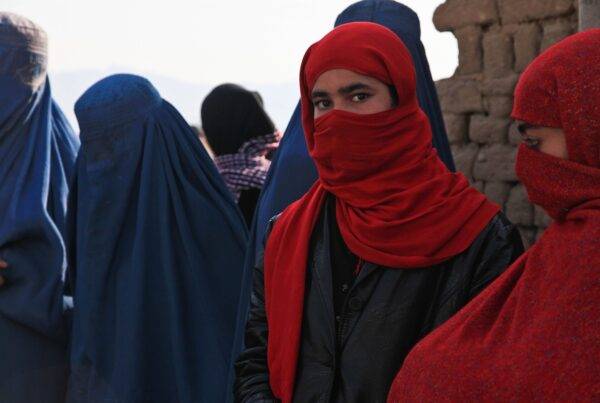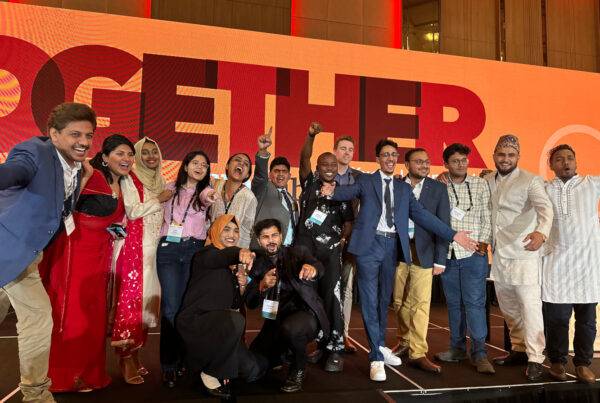Bikalpa – an Alternative in collaboration with Language for Liberty Institute (LLI) and with the support from Atlas Networks, Samriddhi Foundation hosted a Five day residential “Liberty Camp” training at Dhulikhel Village Resort, from 21th to 26th September 2019. Liberty Camp is organized every year in different parts of the world, attracting people interested in spreading or exploring the idea of liberty.
The objective of the event was to educate the youth about History and origin of liberty, Philosophy of Liberty, Freedom of Trade and Doing Business, Freedom, Entrepreneurship and Responsibility, The program was also aimed to understand a holistic picture on cross-sectoral topics.
Overview of the Workshop
During this Liberty Camp training in Dhulikhel, 23 aspiring participants from different part of Nepal, working on the different organizations and diverse issues joined the workshop. Among distinguished speakers were Mr. Andy Eyschen (co-founder and director of the Language of Liberty Institute), Mr. Glenn, (Founder of Language of Liberty Institute), Mr. Barun Mitra (Founder and director of the Liberty Institute) were the resource person and panelists in the event. Also, Mr. Deependra Chalulagian (Director of Operations at Samriddhi Foundation) and Mr. Govinda Sharma Ghaire (Tax Payers Association Nepal) were invited as a Local resource person for training. It was a pleasure hearing from all of them.
The program officially kicked off on September 21 with a welcome reception at Dhulikhel village Resort by Basanta Adhikari (Founder and Director of Bikalpa an Alternative). After welcoming the participants, Mr. Basanta Adhikari shared the objectives, overview and importance of the training, detailing the idea behind the process of how it started, key issues behind it, why it was important and how it was all made possible to bring this training to Kathmandu, outside Biratnagar. Following this, the remainder of the workshop was facilitated by Bikalpa’s team members and few other facilitators.
Over 5 days, a wide range of topics were discussed during the training sessions. Such as, Liberal Philosophy, Rule of law, Free Market Economics and Entrepreneurship in these sessions. The program comprised of the following topics.
- Liberty in England 1770-1790
- History of liberal thought, part 1 — From Socrates to John Stuart Mill
- Public policy in Nepal from outside – an open discussion
- Liberty in France & England 1840 -1860
- Freedom, Democracy & Role of Government
- Introduction to Free – Market Economics
- You want to be an Entrepreneur
- How Taxation discourage doing business in Nepal?
- Why Bikalpa is in the idea Business?
- Liberalism in England & France in 1840
- Rule of Law & Natural Right Theory
Glenn Cripe
In his session Glenn introduced the participants about Liberty Camps and Seminars where he talked how these kind of program are helping to spread the idea of classical Liberal Philosophy in the world. He reviewed the classical Liberal Philosophy and talked about the Political Guidelines: Powers, size, function, funding, control, our relationship with government: Limited, free trade, low taxes, individual rights, Economic policy: What kind of system? What is capitalism? How many types? He also talked about the Industrial Revolution 1750-1800, American Revolution 1770-1795, French Revolution (1789) and Conflicts of 1840-1850 which help to made better understanding of rights (positive /negative, origin, role of government). During his presentation he also introduced different liberal thinker and American founding Father such John Locke, Adam Smith, John Stuart Mill ,Frédéric Bastiat Thomas Paine , Thomas Jefferson, Benjamin Franklin George Washington etc. and their contribution on the development of Liberal philosophy.

Andy Eyschen
During the training hour Andy Eyschen took varied session on History of Classical Liberal Philosophy England: 1640 to 1873, Free Market Economics and So you want to be an Entrepreneur?. He talked about the Historical philosophy and how from different era of time it have been evolving in human life. While the majority of students had not been previously exposed to classical liberalism philosophy, they all appreciated the idea of Individual, political and economic freedoms which were highly skeptical in current scenario of Nepal. He also shared how concept of individual liberty was derived and introduced to British History and Key Liberal Philosophers. In other topic he talked about the Economics and Entrepreneurship where he emphasized on two major Schools of Economics:
– Keynesian versus Austrian (Mises/Hayek)
– Emphasis on Macro versus Micro
He said Free market means: Free = Voluntary (no third party force involved) and Market = (Trading with everyone else, seeking a win-win situation) which means there will always win – win situation when two individual trade. Also participants were exposed to Austrian versus Keynesian Economics and how it work in today’s world. While discussing about entrepreurship he talked about how Word “entrepreneur” was coined by JB Say, French economist, around 1800. He highlighted Governments do not and cannot create wealth: entrepreneurs do. So, Wealthy countries have lots of entrepreneurs. To increase wealth, we have a choice of 2 systems: socialism & capitalism. Socialist economies have few
entrepreneurs and Free Enterprise Capitalism has proven to be the better system to create wealth; it is the primary cause of the improving standard of living over the past 200 years; it is also a moral system as it is based on voluntary exchange, not force. He also gave an example how China under communism was very poor (from 1949 to 1978) and Introducing a capitalist economy in 1978 and encouraging entrepreneurs Chinese are creating economic “miracle.
Dipendra Chaulagain
Dipendra Chaulagain led a brainstorming session on Public policy and invited all attendees to discuss about the issues. His talk was focused on the cost-benefit analysis, Policy formulation, Policy Adoption, Policy Assessment and Policy implantation. He said that although many of us are not interested in public policy issues, we can’t rid of it throughout life. He also presented clarification on how interest groups work for policy formulation in Nepal and provide own suggestions, which were thoughtful and persuasive. He shared his experience based on his engagement with the policymakers that there was a huge disparity between the intention and the consequences, as well as lack of a proper policy feedback mechanism. He said that most of the policies were intended at regulating and had plenty of policy loopholes, which allowed the political leaders and bureaucrats to interfere and benefit from.
Barun Mitra
Barun Mitra founder and director of the Liberty Institute session was on “The interface between politics and public policy” and Rule of Law “Dharma, Justice & Constitutional Morality”. He stressed on the foundation of the concept of dharma and gave instances in Ancient Indian history like Ashoka’s message of Justice through governance based on the righteousness of duty. He also talked about the concept of Ram Rajya and Magna Carta which has helped in shaping the Justice system of the Modern world. He told Institutions and systems may need rules and regulations, but individuals make up those systems. If the individuals are honest and truthful, the institutions they are a part of automatically become the beacon of honesty and truthfulness. He also spoke about the unique attributes of Dharma and its relevance in contemporary life. While talking about Foundations of Liberalism he said democracy is not majority rule. In democracy freedom of Expression: the legitimacy of discourse, debate, and dissent enable citizens to hold the state accountable. Rule of Law helps in access to the efficient and effective justice system and Freedom to Choose on economic, political and social matters in every individual life. He also talked about liberalism thorough Gandhianin philosophy because Gandhi preached nonviolence which is very in the creation of a Liberal and just society.
Basanta Adhikari
During his session, Mr. Basanta Adhikari shared about his personal journey for Liberal ideas and gave a presentation on How Bikalpa is working and raising public voices in public policy issues. In his interaction, he laid emphasis particularly on the economic issues which are currently trigging the growth of Nepal. He also highlighted the importance of communication and how writing can be an ideal tool to express your thoughts. He asserted how writing can build narratives and discourses.

Govinda Sharma Ghaire
Mr. Govinda Sharma from Nepal Taxpayers’ welfare society took a session on “HOW PRESENT TAXATION DISCOURAGES DOING BUSINESS IN NEPAL”. He talked about the different aspects of the taxation system in Nepal. He said tax is only the source of means for the government revenue. So, present government is focused on increasing tax in different areas. He suggested, in order to increase mobility of production and flow of capital the government should adapt the policies that lower taxes on capital which will relatively attract more business. He also highlighted the sources of a budget which showed that Nepal government expenditure is more than income. Due to this Nepal is having a huge trade deficit. His presentation also included Regulatory Requirements, Common Type of Taxes, and Constitutional Provision for Taxation in Nepal, Right of Taxpayers, Tax Compliance, and Distribution of Sources of Revenue.
Challenges
The training was conducted outside the Biratnagar. So, the challenge for us as an organizer was to commit whole weeks of time.
Due to the festive season, many candidates withdraw their participation.
At last hour one of the participants did not receive the phone and was unable to join the workshop.
Concluding Remarks
Despite few challenges, the training was well organized and was helpful to enrich participant’s knowledge and understanding on the issues of liberty. Questions were taken from a participants during the session’s hour and participants were open enough to share their queries regarding the topic. All the participants ended with a note that they had good experience and had good connection of Network. During the training hour variety of interactive learning methods were included such as dynamic games, dialogues, panel discussion and documentaries. These contents helped participants with opportunities to explore and share ideas about policy-based solutions to social problems from a liberal perspective. Altogether, the event was summed up by distributing the certificate at the end of the program at 25th September 2019.







